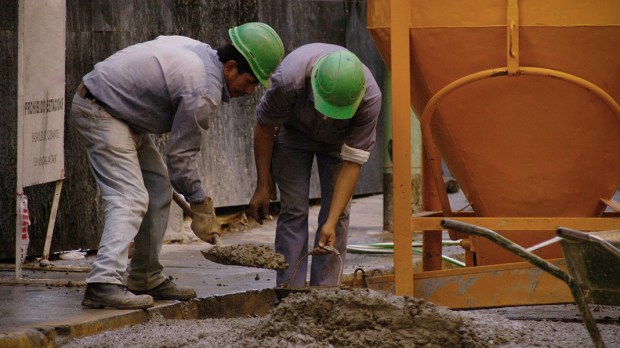I was talking to a scared undergraduate the other day. Looking at the world, she saw nothing but opposition to her Catholic faith and terrible failures by Catholic laypeople and clergy. She was worried.
“Does the Church even have a future?” she asked.
“Are you kidding?” I answered. “The Church’s future never looked brighter! The Church has solid answers to every single one of the world’s ills,” I said. “We shouldn’t be afraid of the world, we should be pitying it and running to its aid!”
I didn’t quite convince her. But I started to. Let’s see if this helps.
The Catholic Church has always been at death’s door AND on the cusp of a major victory.
Cardinals say they chose Pope Francis because he gets this. “Do not be afraid to go and to bring Christ into every area of life,” he said, after becoming pope.
Catholic institutions from coast to coast are doing just that — from Thomas Aquinas College in California to New Hampshire’s Northeast Catholic University, from the Napa, California, Summer Conference to Washington D.C.’s National Catholic Prayer Breakfast.
Halfway in between the coasts, Benedictine College in Kansas, where I work, has been gathering people to talk about transforming the culture. Leaders in industry, thought leaders, and subject-matter experts are helping us plan for a bright future.
What needs to change? A lot.
Communities are fraying as neighbors don’t know each other, toxic political discourse turns disagreements into hatred, and smartphone and gaming technologies connect far-away strangers in superficial ways while leaving family members feeling isolated from each other.
Faith is fading in many communities, and crime and suicide are rising. “When you suppress the desire for God, it’s very dangerous psychologically. I see it all the time in the form of addictions and deep depressions,” said Los Angeles Bishop Robert Barron. “It’s dangerous stuff, to shut down the aspiration toward God.”
Scholarship is in trouble, too. Universities shape society’s leaders, from its courts to its schools to the media. But today, “Political life and discourse in the United States is at a boiling point, and nowhere is the reaction to that more heightened than on college campuses,” Middlebury professor Allison Stanger wrote in the New York Times after a scholar’s visit to campus caused riots.
But the Church insists that Catholics are still able to transform the world — and even explains how.
“The purpose of the Gospel, in fact, is to transform humanity from within and to make it new,” St. John Paul II explained in The Gospel of Life. “Like the yeast which leavens the whole measure of dough, the Gospel is meant to permeate all cultures and give them life from within.”
The trick is to stop thinking the way St. Peter did after the crucifixion, and start thinking the way he did after Pentecost.
After the crucifixion, all seemed lost. Jesus had been killed, the word’s mightiest empire and the religious establishment were working together to oppose them, and no one seemed to care what they had to say. After Pentecost, all those facts remained the same, but now he knew that Christ had risen from the dead and the Holy Spirit — God himself — was with them.
From that day forward, Christianity has never stopped growing.
It grew from the ruins of the Temple after it was destroyed and it grew from the ruins of the Roman empire after it collapsed.
How was Europe’s culture transformed?
Pope Benedict XVI took his name from the great saint he credited with renewing “the civilization and culture” of the West.
“Today, in seeking true progress,” he said, “listen to the Rule of St. Benedict as a guiding light on our journey. The great monk is still a true master.”

Read more:
The 6 things we’d have to change if we applied St. Benedict’s Rule to family life
When St. Benedict wrote his Rule, his culture was collapsing in many of the same ways America’s is.
- Communities were frayed as the decaying Roman roads became dangerous and commerce slowed to a trickle.
- Faith fractured as various communities went their own way, unaware or uninterested in what the Church taught.
- Scholarship was in a worse crisis than today, as literacy rates disappeared and the great works of civilization were lost or ignored.
St. Benedict and St. Scholastica’s monasteries lit small lights in the darkness. But it was enough. The abbeys became the centers of community, faith, and scholarship. From them came spiritual giants such as St. Gregory the Great, St. Boniface, St. Augustine of Canterbury, and St. Hildegard of Bingen, who spread Benedict’s light to the pagan kingdoms of Europe and fanned it into a fire.
The same thing can happen in America.
When New York Cardinal Timothy Dolan visited Kansas, he said: “The dream and dare of the Benedictines to renew culture through Catholic higher education is as game-changing today as it was in the sixth century.”
The same three tools — community, faith, and scholarship — can transform culture in America.
An age of incivility and isolation needs community, a time of hopelessness and rage needs faith, and an era that has abandoned the search for truth needs scholarship.
So don’t fear the world. Think of it as a helpless giant who desperately needs our help.
I’ll ask that undergraduate if she believes me now.

